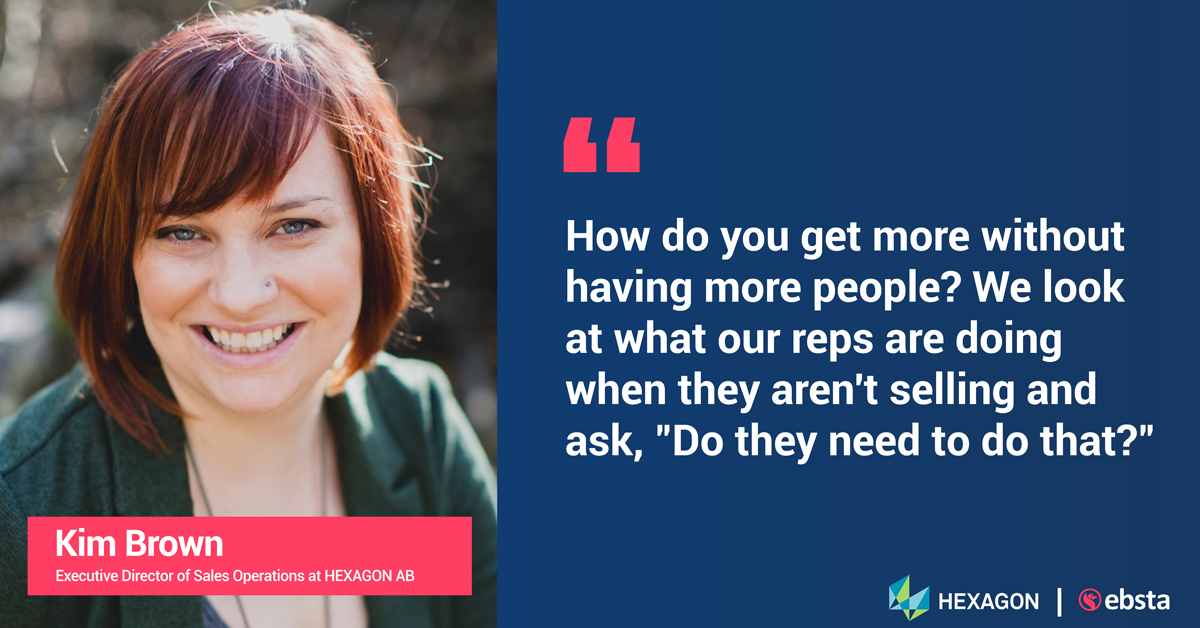Table of Contents
Share this article
Learn from the brightest minds how to predictably and efficiently grow revenue.
Related Content
37% ‘Data-Driven’ Growth in Under 12 Months ft. Shianne Sampson
In this episode of Revenue Insights, host Guy Rubin, CEO of Ebsta, sits down with Shianne Sampson, Global VP of Sales at Eventbrite, to explore how data-driven decision making, structured coaching, and intentional leadership can turn underperforming sales teams into high-performing engines of growth. With over 18 years of experience scaling sales organizations at companies…
Why Top Sales Leaders Get Coaching Wrong – And How an Olympian Fixes It with Matt Hemingway
In this episode of Revenue Insights, host Guy Rubin, CEO of Ebsta, sits down with Matt Hemingway, Vice President of Sales and Operations at Axcient, to explore how disciplined coaching, intentional leadership, and a culture-first mindset drive sustainable sales performance. Drawing on his background as an Olympic silver medalist, Matt shares how the mindset of…
How Top Performers Handle Objections 80% Earlier, with Hervé Timsit from EDB
In this episode of Revenue Insights, host Guy Rubin, CEO of Ebsta, sits down with Hervé Timsit, Chief Revenue Officer at EDB, to explore objection handling and the evolving landscape of enterprise software sales. With over 17 years of experience, Hervé shares insights on leading global sales teams, implementing data-driven strategies, and the critical role…
Executive Director Of Sales Operations: Kim Brown at Hexagon AB
Kim Brown jumped onto Sales Operations Demystified to share her knowledge and experience in Sales Operations. Check out all the other episodes of Sales Operations Demystified here.
You can learn more about:
Table of Contents
Tools Mentioned:
- Pardot
- Connect & Sell
- Salesforce
- Dun & Bradstreet
Key Takeaways
The most common route into sales ops
After 60 or so interviews… you start to see trends
Kim started out her career as a sales rep at a business call NComputing that sold thin clients and desktop virtualization, though a short while after she started… they asked her if she wanted to become a team lead and to help transform the sales development department – this was her first taste of sales ops.
This is the most common route I have seen to get into sales ops. You first join a sales team, experience what it is like to be a sales rep, but then also really enjoy the data/scientific side of running a sales process and then seek an internal transfer into the ops team.
You need a passion “for the deal” to succeed in sales
Kim is a big believer that you must love sales to succeed in sales ops, a previous guest of the show: Jeff Serlin said: “You should love some part of sales so much it just drives you”.
Kim’s motivation comes from knowing that everything she does helps the whole business drive more revenue: “If what I’m doing isn’t helping the reps close deals, then what am I doing?”.
What “breaking the marriage before it happens” means in the world of onboarding reps
Kim states that: “It’s easier to break the marriage before it happens than if it doesn’t work out 6 months later”. This means that if her team is onboarding a sales rep and they can see that things are not going to work, they fire the rep as soon as they can. Most teams would say “oh they are not performing now but they will probably improve”… Kim disagrees.
One method Kim uses to determine this having brand new reps do mock demos for us: “Hey, we know you don’t know our product, but give it your best shot.”. This shows Kim the reps natural ability of the new rep to engage and build rapport with a prospect. If they don’t have that, then it may be worth ending the marriage before it happens.
The two sides of data quality
Kim views Salesforce data quality in two camps: the quality of data coming into Salesforce and then the information that the company is basing decisions on, she views these as two very different things.
Kim uses a lead development rep, RingLead and a number of other data services to ensure the cleanliness of all new data coming in.
Relentless focus on getting more from the same amount of reps
Kim has a relentless focus on getting more out of each rep. They looked at what their reps were doing and found out that only 50% of their time was spent reaching out to and speaking with customers and the rest of the time organising their data and other miscellaneous admin.
They therefore employed a lead development rep who only role is to ensure that each sales rep has the right amount and quality of data to reach out too, this is saving each rep one hour per day which gives them X more of conversations in a month, and which should equal to X amount of incremental opportunities created.
Rep commitment as a sales forecasting metric
Kim and her team use “rep commitment” as the most weighted factor in their sales forecasting process. E.g. if a deal is in the final stage of the process but the rep isn’t feeling confident, then this reduces the amount of revenue forecasted. Alternatively, if a rep commits to a deal, Kim is expecting a signed deal on the date committed by the rep, regardless of pipeline stage.
Subscribe To Sales Ops Demystified:
Quote:


